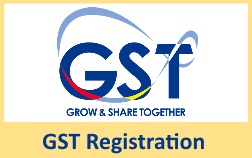Professional Insights: Why CFO Account & Services is Perfect for GST Registration in Singapore
Professional Insights: Why CFO Account & Services is Perfect for GST Registration in Singapore
Blog Article
Navigating the Complexities of GST Registration: A Comprehensive Overview for Company Owners
Browsing the intricacies of GST registration can be a complicated job for several company owner, as it entails a myriad of rules, laws, and processes that have to be followed. With the ever-evolving landscape of tax laws, making certain compliance and understanding the ins and outs of GST registration is vital for the seamless operation of any kind of organization. From establishing qualification and gathering the required paperwork to maximizing procedures for maximum effectiveness, this detailed guide intends to provide business proprietors with the expertise and devices required to navigate the intricacies of GST registration efficiently.
Qualification for GST Enrollment
Service owners must meet particular requirements to determine their eligibility for GST enrollment. In general, businesses with a yearly turnover going beyond a certain threshold are called for to sign up for Goods and Solutions Tax (GST)
Furthermore, companies that are registered under any kind of previous tax obligation program, such as VAT or service tax obligation, are typically required to transition to GST registration. Recognizing these requirements is critical for business proprietors to make sure compliance with the law and stay clear of any charges or lawful issues. It is a good idea for entrepreneurs to seek advice from with tax specialists or lawful consultants to assess their qualification for GST registration properly. By sticking to the required criteria, services can smoothly navigate the intricacies of GST registration and run legally within the tax obligation framework.
Documents Needed for Registration
To finish the GST enrollment process, organizations require to collect and send an extensive set of files. The vital files needed for GST enrollment generally include proof of business enrollment or unification such as the Certification of Unification, collaboration act, or any kind of other registration certificate. Additionally, organizations need to provide identification and address evidence of the promoters or partners, which can be in the form of Aadhar card, PAN key, chauffeur, or card's license. Financial records such as bank statements, proof of workplace like rental contract or electrical power bill, and licensed signatory details are additionally important for the registration process.
Additionally, specific files associated with the nature of business, such as a checklist of services or goods supplied, HSN codes for products, and SAC codes for solutions, might be needed - Why choose CFO Account & Services for GST registration in Singapore. It is vital for services to make sure that all records submitted are precise, current, and in the suggested format to stay clear of any type of delays or complications in the GST registration process
Refine of GST Registration
Having actually put together the requisite documentation, businesses proceed to initiate the GST registration procedure by involving with the online website marked for registration. This on-line site is the Product and Provider Tax Network (GSTN) website, which functions as the main system for all GST-related activities in India. Upon accessing the site, services are called for to fill in the GST enrollment kind with precise details concerning their organization tasks, turnover, and various other relevant information.
When the kind is finished and sent on the site, the GSTN validates the details offered by the business. Adhering to successful confirmation, a GST registration certificate is issued to the company entity.
It is vital for businesses to make sure that the details supplied throughout the GST enrollment procedure is accurate and approximately date to prevent any type of potential problems or hold-ups in getting the GST enrollment certificate.
Understanding GST Compliance

Businesses require to be knowledgeable about the different GST compliance requirements based on their turn over, nature of services or goods, and the states in which they run. It is crucial to stay upgraded on any adjustments in GST regulations and policies to avoid any type article source of non-compliance concerns.
Non-compliance with GST laws can lead to substantial penalties, fines, and even legal consequences. Organizations must invest time and resources in informing themselves and their personnel on GST conformity. Looking for professional help from tax obligation advisors or experts can likewise aid in navigating the complexities of GST conformity and making certain that businesses run within the lawful structure.

Tips for Optimizing Company Operations
For enhanced performance and efficiency in business procedures, tactical preparation and streamlined processes are necessary parts. One pointer for maximizing business operations is to utilize innovation effectively (Why choose CFO Account & Services for GST registration in Singapore). Executing the best software application services can automate repeated jobs, enhance accuracy, and enhance general workflow performance. Additionally, conducting normal efficiency analyses and collecting feedback from workers can give valuable insights for identifying bottlenecks and areas for renovation.
One more crucial facet is his response focusing on jobs based upon their relevance and target dates. By developing a clear hierarchy of tasks and setting practical timelines, organizations can ensure that important tasks are finished in a timely manner. Cultivating a culture of open communication and partnership among group members can lead to enhanced performance and development.

Final Thought
Finally, browsing the complexities of GST registration calls for a clear understanding of eligibility requirements, needed records, registration processes, and conformity demands. By sticking to these guidelines and enhancing company procedures, company owner can ensure smooth operations and conformity with the GST policies. It is vital for businesses to stay informed and updated on GST regulations to avoid any kind of fines or legal issues.
The vital papers required for GST registration commonly include proof of service enrollment or consolidation such as the Certification of Unification, collaboration deed, or any kind of various other registration certificate.Having actually constructed the requisite paperwork, organizations continue to launch the GST registration procedure by involving with the on the internet site marked for registration. Upon accessing the website, businesses are required to fill up out the GST registration type with exact information regarding their business tasks, turn over, and other relevant information.
In order to preserve adherence to GST policies and prevent fines, companies must prioritize recognizing GST compliance. By adhering to these guidelines and maximizing business procedures, service owners can guarantee smooth operations and conformity with the GST regulations.
Report this page